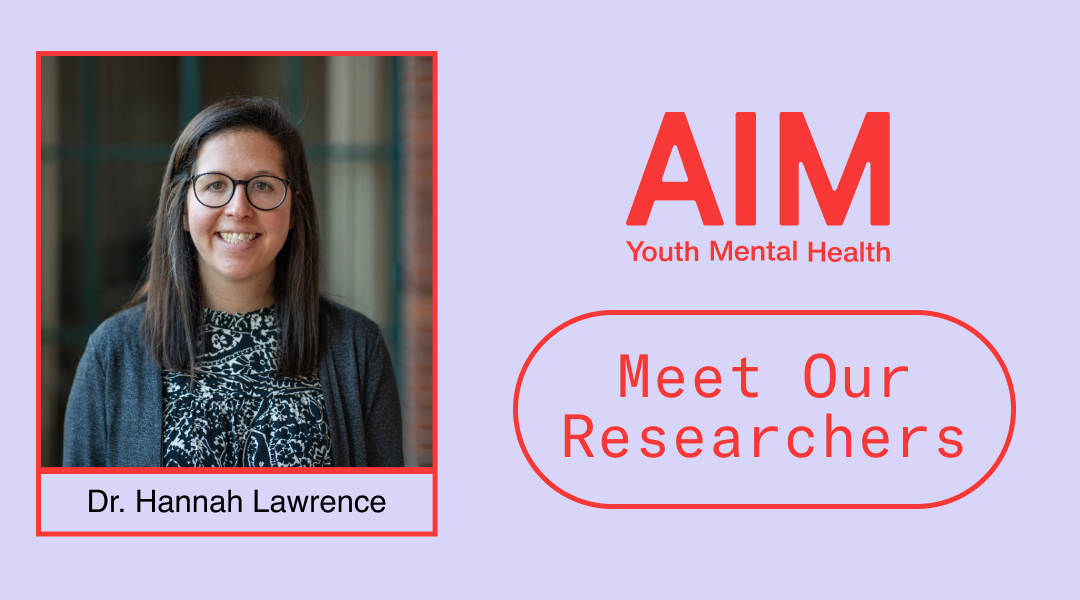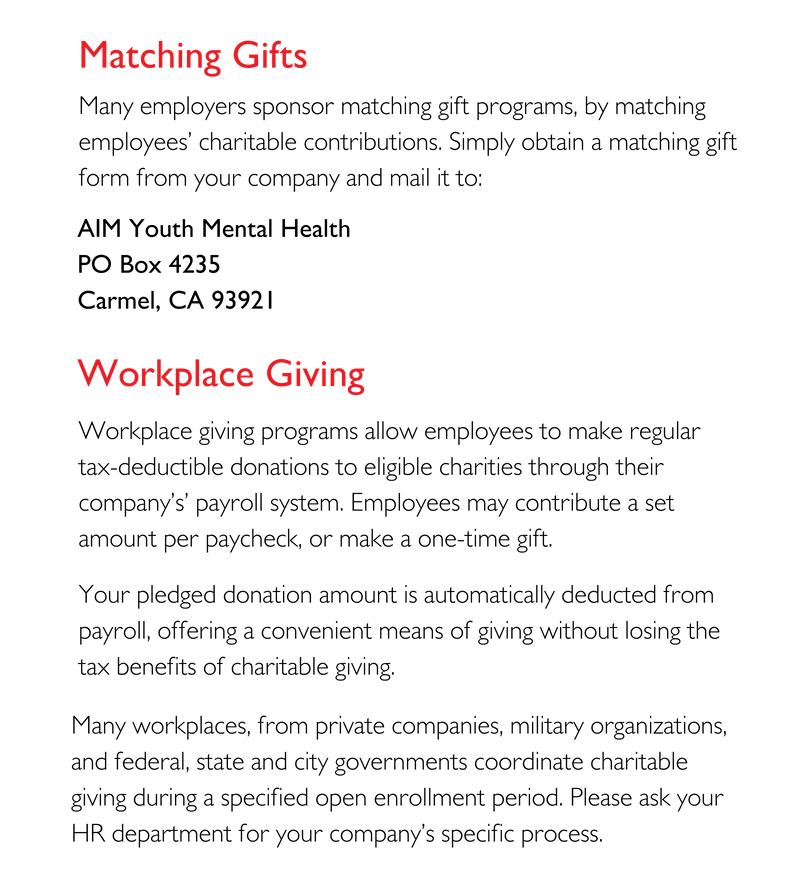

By Meadowlark Monaghan, AIM Youth Advisory Board Member
Welcome to Research Updates! A new series where we share interviews with our doctors and fellows conducting groundbreaking research on all aspects of youth mental health.
Dr. Hannah Lawrence is an assistant professor at Oregon State University in the School of Psychological Science where she leads the Translational Imagery Depression and Suicide (TIDES) Lab. Dr. Lawrence’s program of research examines the role of problematic cognitions, or thinking patterns, in youth internalizing disorders and tests the efficacy of new interventions designed to help youth disengage from these negative thinking patterns. She aims to develop treatments that are scalable and delivered to youth in the very moments in which they need support.
Dr. Lawrence’s study is well-positioned to test whether a smartphone-delivered mindfulness intervention reduces anxiety and depressive symptoms in adolescents by helping them disengage from repetitive negative thought (RNT). By delivering mindfulness skills in response to adolescents’ reports that they are engaged in RNT, adolescents receive support in the very moments and settings in which they need them.
In addition, this approach is highly scalable, and thus has the potential to reach a greater number of adolescents than traditional psychotherapy, increasing access to care for the many youth who need mental health support.
Hi Dr. Lawrence! Please tell us about your study.
The goal of the AWARE Study is to learn how we can better help teens get unstuck from unhelpful thinking patterns.
We all think about or imagine negative things from the past or worry about negative things that could happen in the future. When we get stuck dwelling on these things, however, we can start to experience anxiety or depressive symptoms. In our study we hope to understand teens’ experiences while they are stuck in negative thinking patterns by having them think about or imagine something negative from their past or future while we collect data on their breathing, heart rate, and mood.
We also hope to help teens get unstuck from these negative thinking patterns more easily in their daily lives. To do this, we send teens quick surveys to their smartphones three times per day. When they tell us they are stuck in negative thinking patterns we send them a quick, 1-2 min mindfulness exercise to try out at that very moment. Teens also fill out questionnaires about their mental health throughout the study to see whether the mindfulness skills help them get unstuck from negative thinking patterns and also help improve their anxiety and depressive symptoms.
How did this study come about for you?
In my clinical work, I often would work with teens who would get stuck thinking about the past (i.e., ruminating) or worrying about the future. We would meet once per week for therapy and work on skills to get unstuck from negative thinking patterns but oftentimes it was challenging for teens to implement or practice these skills in daily life. We wanted to test an intervention that could help teens throughout the day or help them practice some of these skills between therapy sessions.
Why was mindfulness chosen as the targeted intervention?
There is a strong body of research that shows us that mindfulness can help reduce RNT, but less is known about how well it works for adolescents who engage in RNT or when it is delivered using an ecological momentary intervention where shorter skills are sent to teens in response to their answers on smartphone surveys. We wanted to use an intervention with good research backing but apply it in a new, potentially even more helpful, way.
What does the mindfulness intervention look like?
We have 30 different mindfulness exercises to keep things engaging for teens. Each exercise is a short 1-2 min video that helps teens focus on their breath, do a body scan, or observe and distance themselves from their thoughts/mental images.
What is the benefit of delivering an intervention at the moment of need vs. building a mindfulness practice over time?
There are benefits to both brief mindfulness skills and also developing a mindfulness practice over time. Some research from Dr. Lori Hilt testing a similar mindfulness intervention for teens found that the vast majority of adolescents prefer shorter mindfulness skills to longer ones so we went with what teens want! We are also continuing to ask teens for their feedback throughout our study to continually improve our intervention and how we deliver it.
How do you see intervention applications like this developing in the upcoming years?
Digital mental health interventions are taking off, especially with teens! There is lots of research to support many digital health interventions and also some data that tells us that teens prefer to get mental health information on digital platforms. I hope that in the coming years we see even more integration between digital health interventions and therapist-led interventions.
For example, it would be great if teens engaged in a digital health intervention could access a licensed mental health provider if symptoms worsen or if they need more support in a given moment. It also could be very helpful to therapists if their teen clients could have access to digital health interventions in between therapy sessions to practice the skills they are learning in therapy.
I also hope to see teens have more agency in deciding which interventions might work best for them and if and when they need them. It is often adults who are developing these interventions and then delivering them to teens without teen feedback. We need to involve teens from the ground up in intervention development and decision making if we are really going to help promote teen mental health on a large scale.
______________________
About the Author
Meadowlark Monaghan (she/hers) is a consultant using her knowledge gained as a mental health professional to act as a liaison between brands, creators, + online communities with the field of psychology and mental health. She also co-hosts the personal development podcast, Thoughts May Vary. Her work has been seen with Madhappy, Local Optimist, The Mayfair Group, Lonely Ghost, AIM Youth Mental Health, NAMI San Diego and more.


















 Moving Upstream: A Proactive Approach to Addressing Behaviors and Bullying
Moving Upstream: A Proactive Approach to Addressing Behaviors and Bullying Krista Reuther is the Assistant Director of Ohana’s Community Health and Prevention Program. She received her Masters in Public Health and Social Work at UC Berkeley. She comes to this position after 14 years of clinical social work experience at Stanford Children’s Hospital in pediatric oncology, critical care, and bereavement. Her goal is to reduce the incidence of mental illness in children and adolescents in Monterey County.
Krista Reuther is the Assistant Director of Ohana’s Community Health and Prevention Program. She received her Masters in Public Health and Social Work at UC Berkeley. She comes to this position after 14 years of clinical social work experience at Stanford Children’s Hospital in pediatric oncology, critical care, and bereavement. Her goal is to reduce the incidence of mental illness in children and adolescents in Monterey County. Dr. Guss is a 35-year veteran educator with a doctorate degree in Educational Leadership. She served as a classroom teacher for 10 years, including two years as a teacher in a bilingual program in South Central Los Angeles. She has also served as a college professor, mentor teacher for new teachers, and a master teacher for teacher candidates completing their student teaching experience. She continues to be a strong advocate for the teaching profession.
Dr. Guss is a 35-year veteran educator with a doctorate degree in Educational Leadership. She served as a classroom teacher for 10 years, including two years as a teacher in a bilingual program in South Central Los Angeles. She has also served as a college professor, mentor teacher for new teachers, and a master teacher for teacher candidates completing their student teaching experience. She continues to be a strong advocate for the teaching profession. Fellowship: Stanford University School of Medicine (1994) CA
Fellowship: Stanford University School of Medicine (1994) CA Michael G. Thompson, Ph.D. is a consultant, author and psychologist specializing in children and families. He is the supervising psychologist for the Belmont Hill School and has worked in more than seven hundred schools across the United States, as well as in international schools in Central America, Europe, Africa and Asia.
Michael G. Thompson, Ph.D. is a consultant, author and psychologist specializing in children and families. He is the supervising psychologist for the Belmont Hill School and has worked in more than seven hundred schools across the United States, as well as in international schools in Central America, Europe, Africa and Asia.
 is 15 years old and a sophomore at Marina High School in Marina, CA. Her academic interests include math, history, and psychology. She joined the AIM Ideas Lab in 2021 because she wanted to be a part of something that could have a great impact on her community. Marwa is interested in youth mental health because she has always been fascinated with the human mind and she wants to support those that are suffering who may feel like their challenges in life aren’t important enough or are too afraid to seek necessary help.
is 15 years old and a sophomore at Marina High School in Marina, CA. Her academic interests include math, history, and psychology. She joined the AIM Ideas Lab in 2021 because she wanted to be a part of something that could have a great impact on her community. Marwa is interested in youth mental health because she has always been fascinated with the human mind and she wants to support those that are suffering who may feel like their challenges in life aren’t important enough or are too afraid to seek necessary help. Giovanna Panetta is a 16 year old junior at Carmel High School. She has always been called to STEM subjects, specifically biology. The AIM Ideas Lab instantly attracted her attention as a research opportunity. Gia has always comprehended the importance of mental health. She knows that COVID only exacerbated previously existing problems, and that as a community we can try and find the root of those problems. Mental health is an integral part of life, and can impede a body’s ability to be healthy. She strongly believes that life is worth living, and she wants to help anyone that thinks otherwise.
Giovanna Panetta is a 16 year old junior at Carmel High School. She has always been called to STEM subjects, specifically biology. The AIM Ideas Lab instantly attracted her attention as a research opportunity. Gia has always comprehended the importance of mental health. She knows that COVID only exacerbated previously existing problems, and that as a community we can try and find the root of those problems. Mental health is an integral part of life, and can impede a body’s ability to be healthy. She strongly believes that life is worth living, and she wants to help anyone that thinks otherwise. Dr. Friedman completed her undergraduate degree in Psychology from University of California San Diego (UCSD). She went on to complete her masters and doctorate degrees (Ph.D.) in Clinical Psychology from Rosalind Franklin University of Medicine and Science/Chicago Medical School. Dr. Friedman completed her pre-doctoral internship at Rush University Medical Center, Chicago, IL, and her post-doctoral fellowship training at the VA San Diego Healthcare System. Her clinical training and experience has been focused primarily on comprehensive assessment and effective treatments for anxiety, mood and related disorders. Dr. Friedman has extensive experience in providing Cognitive Behavioral Therapies for anxiety disorders (e.g. worry, OCD, social anxiety, phobias and PTSD), depression, adjustment disorders/life stress, insomnia and body-focused repetitive behaviors (e.g. Trichotillomania and skin picking). She has received training in evidence-based interventions for a variety of specific problems, including exposure with response prevention (ERP) for treatment of OCD, Prolonged Exposure (PE) for treatment of PTSD, and Cognitive Behavioral Therapy for Insomnia (CBT-I). Moreover, she has specialty training in the treatment of childhood anxiety and related disorders, such as ADHD, selective mutism, separation anxiety, PTSD, depression and specific phobias. In addition, Dr. Friedman has developed an expertise in research on Trichotillomania and body-focused repetitive behaviors, which has led to numerous local and national presentations. Dr. Friedman regularly attends local and national conferences, training seminars and workshops in order to stay informed on the most up to date treatments and apply state of the art science into her clinical practice.
Dr. Friedman completed her undergraduate degree in Psychology from University of California San Diego (UCSD). She went on to complete her masters and doctorate degrees (Ph.D.) in Clinical Psychology from Rosalind Franklin University of Medicine and Science/Chicago Medical School. Dr. Friedman completed her pre-doctoral internship at Rush University Medical Center, Chicago, IL, and her post-doctoral fellowship training at the VA San Diego Healthcare System. Her clinical training and experience has been focused primarily on comprehensive assessment and effective treatments for anxiety, mood and related disorders. Dr. Friedman has extensive experience in providing Cognitive Behavioral Therapies for anxiety disorders (e.g. worry, OCD, social anxiety, phobias and PTSD), depression, adjustment disorders/life stress, insomnia and body-focused repetitive behaviors (e.g. Trichotillomania and skin picking). She has received training in evidence-based interventions for a variety of specific problems, including exposure with response prevention (ERP) for treatment of OCD, Prolonged Exposure (PE) for treatment of PTSD, and Cognitive Behavioral Therapy for Insomnia (CBT-I). Moreover, she has specialty training in the treatment of childhood anxiety and related disorders, such as ADHD, selective mutism, separation anxiety, PTSD, depression and specific phobias. In addition, Dr. Friedman has developed an expertise in research on Trichotillomania and body-focused repetitive behaviors, which has led to numerous local and national presentations. Dr. Friedman regularly attends local and national conferences, training seminars and workshops in order to stay informed on the most up to date treatments and apply state of the art science into her clinical practice. Dr. Piacentini is a board-certified clinical child and adolescent psychologist and Professor in the UCLA Department of Psychiatry and Biobehavioral Sciences. He directs the UCLA Child OCD, Anxiety, and Tic Disorders Clinic and Tourette Association Center of Excellence which provide diagnostic evaluation and treatment (both therapy and medication) for youth with the above problems. He also directs the UCLA Center for Child Anxiety Resilence, Education, and Support (CARES; carescenter.ucla.edu) which provides education and programming to parents, teachers, and clinicians about anxiety prevention and management.
Dr. Piacentini is a board-certified clinical child and adolescent psychologist and Professor in the UCLA Department of Psychiatry and Biobehavioral Sciences. He directs the UCLA Child OCD, Anxiety, and Tic Disorders Clinic and Tourette Association Center of Excellence which provide diagnostic evaluation and treatment (both therapy and medication) for youth with the above problems. He also directs the UCLA Center for Child Anxiety Resilence, Education, and Support (CARES; carescenter.ucla.edu) which provides education and programming to parents, teachers, and clinicians about anxiety prevention and management. Citlalli Nava is 18 years old and a first year majoring in Psychology at Hartnell Community College in Salinas, CA. She is passionate about understanding how mental health affects how youth think, act, and feel. Citlalli joined the AIM Ideas Lab in 2021 after witnessing the increase in mental health challenges in teenagers and considering the mental health issues they are facing. Citlalli is interested in youth mental health because it is a real problem faced by her generation.
Citlalli Nava is 18 years old and a first year majoring in Psychology at Hartnell Community College in Salinas, CA. She is passionate about understanding how mental health affects how youth think, act, and feel. Citlalli joined the AIM Ideas Lab in 2021 after witnessing the increase in mental health challenges in teenagers and considering the mental health issues they are facing. Citlalli is interested in youth mental health because it is a real problem faced by her generation. Clinical and community psychologist and health care innovator Arthur C. Evans Jr., PhD, is CEO of the American Psychological Association, the leading scientific and professional organization representing psychology in the United States. With more than 146,000 researchers, educators, clinicians, consultants, and students as members, APA promotes and disseminates psychological knowledge to benefit society and improve lives – a mission consistent with Evans’ life work.
Clinical and community psychologist and health care innovator Arthur C. Evans Jr., PhD, is CEO of the American Psychological Association, the leading scientific and professional organization representing psychology in the United States. With more than 146,000 researchers, educators, clinicians, consultants, and students as members, APA promotes and disseminates psychological knowledge to benefit society and improve lives – a mission consistent with Evans’ life work.


